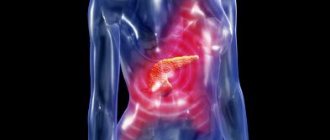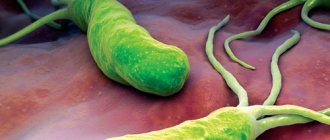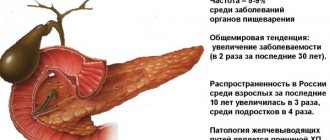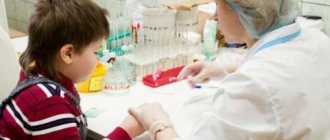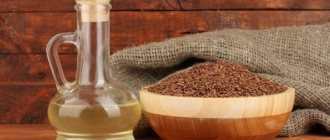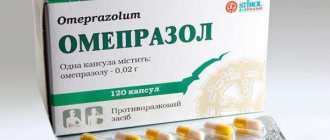Causes of loose stools
Every person has experienced stool disorder more than once. This unpleasant problem is not an independent disease, but a symptom of pathologies of the digestive system. In most cases, diarrhea in children and adults is associated with intestinal infections.
But there are a number of other diseases in which diarrhea becomes a symptom of a serious disorder in the body. They are associated with insufficient production of enzymes that regulate the digestion process and inflammation of internal organs:
- cholecystitis;
- pancreatitis;
- gastritis;
- colitis;
- duodenitis;
- stomach ulcer.
The lack of enzymes produced leads to improper digestion of food. It is intensively excreted from the body, causing prolonged diarrhea, dehydration, and vitamin deficiency. Vitamins and amino acids do not have time to be absorbed in the intestines. The patient loses weight, chronic diseases worsen, fatigue and drowsiness occur. One of the characteristic signs is the appearance of loose stools after eating fried or fatty foods.
Abnormal stool during pancreatitis is one of the first symptoms indicating an exacerbation of a chronic disease. The more often this condition occurs, the more severe the condition of the human pancreas. A decrease in the production of amylase and lipase enzymes provokes a decrease in motility, so when food enters the large intestine, it stagnates. The walls of the organ become inflamed, causing discomfort, pain, and pain in the navel area.
It should be noted that Pancreatin is ineffective against poisoning and intestinal infections. Its use for pancreatitis or cholecystitis is necessary due to a lack of digestive enzymes. Read about the harms and benefits of the drug here.
Video: more details about the drug, application
Read further:
Overdose of the drug "Pancreatin"
Treatment of constipation in pregnant and lactating women
Pros and cons of using a carbon water filter
Diet for poisoning in adults and children - what you can and cannot eat
What to feed a child with food poisoning (diet) - sample menu
Article rating:
Share with friends:
You may also be interested in:
Can children and adults drink nimesil if they are poisoned?
Lactofiltrum for alcohol or food poisoning - how to take for children and adults?
Polysorb in case of poisoning - how to drink correctly, dosage
How to take Filtrum for food and alcohol poisoning for children and adults
Application of Pancreatin
Many people are not aware of the beneficial properties of the product, taking Pancreatin when overeating or just to improve digestion. In fact, it provides assistance in the treatment of serious diseases and pathologies:
- Digestive disorders in humans due to the abuse of heavy and fatty foods, strict diets, and alcohol.
- To replace enzymes in case of pancreatic damage. This is the main purpose of Pancreatin tablets. It is indispensable for dyspepsia that occurs after chemotherapy or radiation, or removal of the gallbladder.
- In preparation for examination of the abdominal cavity before surgery.
- To support the stomach after surgery to remove an ulcer or tumor.
Pregnant women use Pancreatin in the first trimester to eliminate nausea and a feeling of heaviness after eating.
Pancreatin for diarrhea
For non-infectious diseases accompanied by diarrhea, the drug acts as an adjuvant to eliminate the unpleasant consequences of diarrhea:
- bloating;
- cramps in the stomach;
- flatulence;
- loss of fluid and nutrients.
If diarrhea is caused by inflammation of the pancreas, it is characterized by the following symptoms:
- stool with a green tint;
- putrid odor;
- undigested lumps;
- increased frequency of bowel movements 1 hour after a snack.
Pancreatin helps against diarrhea in the following ways:
- enhances the production of missing enzymes;
- stimulates the work of sluggish intestines;
- facilitates the breakdown of fats;
- causes the mucous membrane to absorb drug components and nutrients;
- accelerates the effect of anti-diarrhea medications.
Some information about pancreatin
The name “pancreatin” refers to a complex of pancreatic enzymes - compounds of animal origin that stimulate the process of breakdown and digestion of nutrients - proteins, fats and carbohydrates that enter the body with food.
Taking the medication is accompanied by pharmacological effects:
- the production of your own bile is activated;
- the digestion of food and the movement of the food bolus through the gastrointestinal tract are normalized;
- absorption of nutrients improves.
Therapy with the prescription of pancreatin is advisable for conditions accompanied by a deficiency of its own enzymes:
- pathologies of the stomach, pancreas, intestines, liver, bile ducts;
- dyspeptic symptoms due to violation of the rules of healthy eating (excess fatty, fried foods, poor diet, overeating).
Note! The use of the drug is limited to patients with the acute stage of pancreatitis.
Composition of Pancreatin
The active ingredients in the drug “Pancreatin” are protease, amylase, lipase, trypsin and chymotrypsin. The medicine is made from pork pancreas by grinding and drying it. Thanks to a formula similar to human protein, enzymes are easily absorbed and stimulate the production of their own trypsin, lipase and amylase. Therefore, Pancreatin for stomach pain or diarrhea begins to work from the first use. The composition includes auxiliary components that enhance the effect of the medicine:
- magnesium;
- silicon;
- titanium dioxide;
- sodium chloride; cellulose.
The medicine is available in the form of tablets or capsules, so it is easy to take with you on a trip or to work without interrupting the therapeutic course. The attached instructions contain information about contraindications and side effects of the product.
Treatment of diarrhea with Pancreatin
Problems caused by inflammation of the pancreas or stomach can plague the patient for weeks. In this case, Pancreatin for diarrhea is part of complex therapy, which consists of following a strict diet and limiting physical activity. The patient must remain in bed and undergo an ultrasound examination of the abdominal organs.
To eliminate discomfort, it is recommended to take the following medications simultaneously with Pancreatin:
- Enterosorbents (Enterosgel, Atoxil, Linex). They absorb harmful toxins and normalize the microflora of the small intestine.
- Antibiotics to eliminate intestinal infections. Depending on the cause of the disease, Levomycetin, Enterofuril, and Tetracycline are used.
- Complex of bifidobacteria (Acipol, Hilak Forte, Narine). Taking them reduces treatment time, helps cope with spasms and prevents relapse of dysbacteriosis.
- Medicines to eliminate diarrhea (Enterol, Imodium). Soothe the rectal mucosa, prevent the loss of vitamins and microelements.
- Preparations for restoring water-salt balance (Regidron). Prevents the development of dehydration and improves the patient’s well-being.
Pancreatin for diarrhea should be taken as prescribed by a doctor. The number of tablets to take daily depends on the person’s weight, the severity of the disease and other factors. For adult patients, the following regimen is recommended:
- Intestinal upset after eating stale food or alcohol: 3 times a day, 1-2 tablets.
- Cholecystitis: 3-4 tablets up to 4 times a day.
- In case of chronic pancreatitis without exacerbation, the daily dosage is increased to 20 tablets, which are divided into 4-5 doses.
The dosage of Pancreatin for diarrhea in children depends on the age of the little patient:
- children from 2 to 4 years old are prescribed no more than 3 tablets per day, dividing them into halves;
- for children over 4 years of age, the dose is calculated taking into account the patient’s weight: 1 tablet per 14 kg of body weight;
- if diarrhea is caused by cystic fibrosis, the dosage is doubled.
The duration of the course of treatment is prescribed by the doctor in each specific case. Therapy may last several days or months. Sometimes patients take Pancreatin for years.
Measures to prevent pancreatitis
When diagnosing pancreatitis of the pancreas, it is important to carry out disease prevention in order to avoid relapses of the disease and increase the time of remission.
Prevention of pancreatitis
Pancreatitis is considered a disease of adults who have led an unhealthy lifestyle for a long time: they ate unhealthy food, abused alcohol, took medications in large quantities, and moved little.
It must be taken into account that prevention of acute and chronic pancreatitis consists of many points that must be accurately followed. And only then can further development of the disease and relapse of the pathology be avoided.
Prevention of pancreatitis is divided into primary and secondary. Primary prevention measures include those preventive measures whose goal is to prevent the initial occurrence of inflammation. Prevention of pathology consists of measures aimed at eliminating the causes that cause it.
Secondary prevention of pancreatitis consists of measures that are aimed at preventing relapses and complications of chronic pancreatitis.
In the primary prevention of chronic pancreatitis, general improvement of the body is carried out and the causes that provoke the occurrence of pathological changes are eliminated. The negative points are:
- eating fatty or spicy foods;
- smoking;
- alcohol consumption;
- constant overeating.
These factors are most dangerous for those whose relatives already have pathologies of the pancreas; there is a genetic predisposition to this pathology.
In addition, various diseases of the pancreas and gall bladder can affect the appearance of pancreatitis.
Based on the foregoing, doctors recommend following these tips to prevent pancreatitis:
- giving up or minimizing bad habits;
- eating foods low in salt, sugar, fat and cholesterol;
- the diet should be varied and consist of a large amount of grains, vegetables and fruits (preferably not raw);
- drinking at least 2 liters of water daily;
- It is periodically recommended to do fasting days, taking only easily digestible food on these days.
The diet must fully comply with the rules of a healthy diet, but it is not as strict as with an existing pathology.
Treatment and secondary prevention of pancreatitis
Pancreatitis is not a disease that can be treated independently at home. Even the pain itself can be so severe that patients without medical help can die from painful shock.
At home, while waiting for a doctor, to alleviate the condition, the patient should take an antispasmodic tablet: “No-shpu” or “Papaverine”.
Other drugs are not recommended so as not to blur the picture of the disease and not interfere with the correct diagnosis.
The patient should be at maximum rest while lying down; cold should be applied to the location of the pain. In case of acute pancreatitis, you should drink warm water and not eat for some time.
Already in the hospital, in addition to taking medications, a period of fasting is expected, which lasts from 3 days to a week (the duration depends on the stage and form of the pathology). For certain forms of pancreatitis, surgical intervention is required.
Treatment and the further period of rehabilitation require the patient to comply with certain rules and a strict diet. This applies especially to patients with chronic pancreatitis. To prolong remission, they must strictly follow the rules of secondary prevention:
- get rid of bad habits;
- keep the balance of food intake under control;
- maintain physical activity, monitor your weight;
- follow the diet prescribed by your doctor;
- carry out control examinations;
- Take medications prescribed by your doctor if necessary.
In addition to chronic and acute pancreatitis, reactive pancreatitis can be distinguished. This disease is quite dangerous and can sometimes result in serious complications and even disability. In especially severe cases there is a risk of death.
Reactive pancreatitis in children
The appearance of acute or chronic pancreatitis in children at an early age is usually not observed, with the exception of congenital pathology or abdominal trauma.
Reactive pancreatitis in a child is an inflammatory process provoked by other pathological phenomena:
- long-term use of certain medications;
- infection or parasitic infections;
- abdominal injury;
- poisoning;
- poor nutrition for a long time.
Chronic pancreatitis
For primary prevention of acute pancreatitis, the following rules must be followed:
- do not smoke, do not drink alcohol;
- avoid nervous tension, play sports;
- promptly diagnose and treat pathologies in nearby organs: glands of the endocrine system, liver, stomach and intestines;
- do not take medications that affect the functioning of the pancreas;
- monitor proper nutrition;
- drink enough water per day;
- organize the use of enzyme preparations for prevention.
Secondary prevention is to prevent the occurrence of chronic pancreatitis; it is necessary to exclude the occurrence of the disease. Strict adherence to all prescribed doctor’s recommendations will ensure cure and prevent pancreatitis from becoming chronic.
Alcohol
Alcohol consumption is the main risk factor for pancreatitis. Frequent consumption of alcohol causes great harm, and this does not depend on the strength of the drink. A complete abstinence from alcohol is required.
Smoking cigarettes
Nicotine and tar have a detrimental effect not only on the pancreas, but on the entire body as a whole. Nicotine promotes excessive stimulation of gastric secretion, irritates and promotes inflammation of the mucous membranes of the gastrointestinal tract.
Right way of life
It consists of maintaining a sleep schedule, rest, physical activity, and eliminating stressful situations. These factors help strengthen the body and protect against various pathologies, including pancreatitis.
Accompanying illnesses
As a preventive measure, therapy is necessary for diseases that may affect pancreatic function. This applies to chronic inflammation of the gallbladder. Surgical treatment of cholecystitis can correct the situation with chronic pancreatitis. It is important to monitor the condition of the duodenum (DPC) and stomach.
Medications
Medicines can provoke an exacerbation of the disease, an inflammatory process in the pancreas.
Medicines that can only be taken under the supervision of a doctor:
- narcotic analgesics;
- antiepileptic drugs;
- oral contraceptives;
- antidiabetic agents;
- immunosuppressive drugs;
- antibacterial drugs;
- diuretics;
- statins;
- steroids;
- antimicrobial sulfonamide groups;
- drugs to lower blood pressure;
- immunostimulants.
The pancreas is very difficult to treat; the disease is easier to avoid than to cure.
Nutrition, one of the stages of prevention
To prevent pancreatitis, you should follow a diet that is not particularly strict - it is recommended to exclude the most harmful foods from your diet.
| Allowed to use | Eliminate from diet |
| lean poultry or fish - boiled or steamed | fatty broths |
| soups with recycled meat broth | pork fat |
| milk soups with added cereals | fatty foods |
| vegetables, boiled or steamed, in the form of soups (without cabbage) | spicy dishes, smoked meats, seasonings, preserves |
| various cereals | fast food dishes |
| boiled noodles, vermicelli | fatty fish, caviar |
| omelette | boiled and fried eggs |
| wheat bread | glazed cheese curds |
| cheeses (only mild and low-fat) | rye bread and pastries |
| cottage cheese casseroles | strong tea, coffee, cocoa, carbonated drinks, kvass |
| dry biscuit, marmalade, biscuits, marshmallows, marshmallows | citrus |
| dairy products (low fat) | turnips, radishes, sorrel |
| honey (no more than 2 spoons per day) | nuts |
| compote, jelly, weak tea | certain types of fruits: figs, grapes, dates |
| sweet apples | goat milk |
| salted lard (no more than 50 g per week) | full fat sour cream |
The following nutritional rules must be followed:
- all dishes should be steamed or baked without crust, or boiled;
- eat food at room temperature;
- reduce salt intake;
- eat in small portions;
- food should be in crushed form
Drug prevention
To prevent exacerbation of chronic pancreatitis, take the following medications:
- Anticholinergics (“Gastrotsepin”, “Duspatalin”). Medicines help relieve spasms of intestinal muscles, reduce gastric secretion, and relieve attacks of nausea and vomiting.
- Enzyme preparations (Mezim, Festal, Enzistal, Pancreatin, Lycrease, Trienzyme) stabilize the exocrine function of the gland.
- Vitamin complexes that serve to maintain optimal functioning of the gland.




